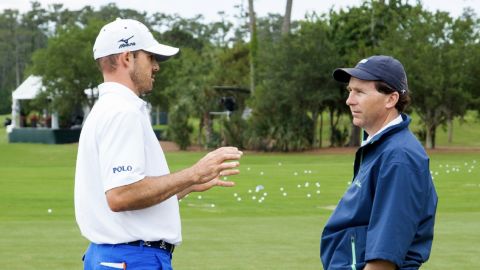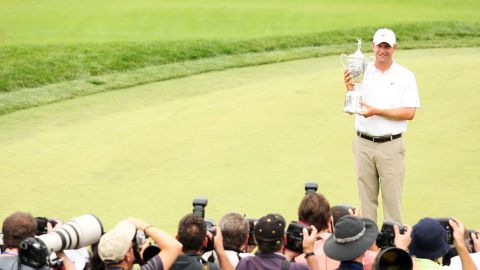CNN
—
dr Morris Pickens remembers the moment he knew he wanted to be a sports psychologist.
A teenage Pickens, tuning in to a basketball night, stared in awe at his TV while a man chatted with NBA icons Karl Malone and John Stockton at the Utah Jazz gym.
The same man, who turned out to be the team’s sports psychologist, was then shown boarding the Jazz’s private plane as the team took off for the Los Angeles Lakers, where he sat courtside at The Forum — just behind the bench — eating popcorn and sipping soda.
“As a 17-year-old boy in rural South Carolina, I’m like, ‘You’re paying this guy?'” Pickens told CNN.
“‘This is ridiculous. I want to do this because it doesn’t look like a job.'”
And so began a journey that “Dr. Mo” to help coach professional athletes in a range of sports – from the NFL to Nascar. But his true home has always been on the fairway.
Pickens was an avid golfer in his youth and wrote on his way to his Ph.D. in Sport Psychology from the University of Virginia. Since then, he has built a reputation as one of golf’s finest psychologists, working with some of golf’s biggest stars over a 27-year career.
A star-studded clientele has racked up 28 PGA Tour wins while working with Pickens, led by four major wins by Zach Johnson, Lucas Glover and Stewart Cink.
With the highly anticipated 150th Open Championship in St Andrews, Scotland set to begin on July 14, Pickens is well positioned to provide insight into what it takes to lift the Claret Jug.
Just months after beginning his collaboration with Pickens in 2009, Cink won his first Major at the 138th edition of the event. Six years later, Johnson – a Pickens customer for 16 years – won his second major triumph at St Andrews.
Fittingly, both players won in exciting four-hole playoffs. For Pickens, trying to reproduce the pressures of game day is the biggest challenge he faces as a sports psychologist. As hard as he tries — talk it through and perform challenging drills — there’s simply no way for Pickens to simulate the psychological toll of an event, let alone a crucial playoff.
“It’s almost impossible — because it’s a physiological thing — to get her adrenaline pumping like it’s going to kick off on Sunday,” Pickens said.
And yet the psychologist’s efforts seem to get the best out of Johnson, a self-confessed hyper-competitive individual who enjoys Pickens’ practice bets, which place small sums of money on the outcome.
“I just love to compete, I love anything that drives me to improve,” Johnson said in a video on Pickens’ website.
“I’m always trying something out that I do in my practice so when it comes to the bottom line of competitions, on tour week in and week out, I know I’ve been there before. I’ve seen it, I’ve felt it and I can be successful.”
The ability to train efficiently touches on the two critical mental qualities Pickens believes elite golfers need: discipline and the ability to control one’s mind.
It may seem paradoxical, but Pickens says that the greatest psychological challenge golfers face when making a swing is simply that the ball is stationary.
While in soccer or tennis the thoughts and corresponding actions of the players are instinctively engrossed in the moving ball, the golfer – forced to consciously fill this mental stillness – must instead train to “occupy his mind”. Cross-sport comparisons can be found in basketball’s free throw and baseball’s pitching.
Essentially, Pickens’ role boils down to this – helping players control their minds, especially in the critical five to six seconds before the swing. Like a form of meditation, players need to know exactly what thoughts are going through their minds.
“Some players count,” Pickens explains. “Come in. One, bat behind the ball. Two, feet down. Third, look at the goal. Four, back to the ball. Five, backswing. Six, by momentum.
“When you have consistent inputs from your thinking, you have a better chance of getting consistent results to hit the shot.”

For Johnson, who suspected something was “not right” in his game prior to his association with Pickens in 2006, the advice immediately stuck and has continued throughout his 24-year pro career.
“I thought I had a good routine, I thought it was consistent, I thought it was repeatable, but it was far from that,” Johnson said in a video on Pickens’ website.
“It was extremely inconsistent, it wasn’t thought through, it didn’t allow me to do my best, nor did it give me confidence and consistency from shot to shot.”
Similar techniques helped Cink free his mind from an over-fixation with results, the American says in a video on Pickens’ website. At 49, Cink continues to build on his eight PGA Tour wins, earning a third RBC Heritage title in April 2021.
Meanwhile, managing the mind was a lesson one hot-headed young Glover – 2009 US Open champion – quickly learned when he began working with Pickens after graduating from Clemson University in 2001.
“I immediately realized that my temperament was affecting my lap a little too much,” Glover said in a video on the psychologist’s website. “DR. Mo basically taught me that it’s okay to get upset and angry, but to let it go quickly and not let it affect the next shot.”

However, the ability to engage the mind is nothing without disciplined practice, Pickens claims.
Instead of going out and just hitting some balls, top pros need to be laser focused in their training. Crucially, as with the pre-swing routine, players should remove emotion from their training – not just thinking about a good day or a bad day, but dispassionately analyzing their performance.
For Pickens, this is one of Johnson’s most exemplary – if often misunderstood – assets.
“It’s not that Zach doesn’t have emotions. Sometimes people misinterpret that and think he doesn’t have them,” Pickens explains. “He’s just really good at managing them and focusing on what he wants to focus on.
“And he’s amazing at saying, ‘Okay, this is what I want to do, and this is how I’m going to do it.’
“A lot of people call themselves professionals but still only go to play golf. The guys who make it understand, ‘I have to treat this like a job.'”
